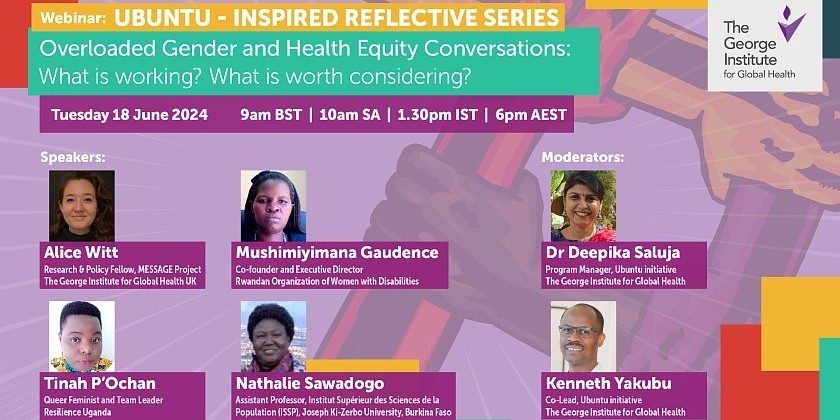About the Ubuntu-Inspired Reflective Series
Drawing inspiration from the African Philosophy of Ubuntu, The George Institute’s regular forum for engaging with African scholars, previously known as the “Tea with Africa” (TWA) Series, has been renamed the “Ubuntu-Inspired Reflective Series.” This new name underscores the importance of embracing relationality and accountability in the way TGI researchers engage with African scholars and their communities. Continuing in the spirit of the previous TWA Series, the Ubuntu-Inspired Reflective Series aims to facilitate knowledge exchange and collaboration among stakeholders interested in promoting health equity in a people and culturally-centred manner, in African countries and beyond.
The panel discussion titled “Overloaded sex, gender, and health equity conversations: What is working? What is worth considering?”, involved Nathalie Sawadogo (Assistant Professor, Higher Institute of Population Sciences, Joseph Ki-Zerbo University, Burkina Faso); Mushimiyimana Gaudence (Co-founder & Executive Director, Rwandan Organisation of Women with Disabilities); Alice Witt (Research & Policy Fellow, MESSAGE Project, The George Institute for Global Health UK); and Tinah P’Ochan (Queer Feminist & Team Leader, Resilience Uganda). It was moderated by Deepika Saluja (Program Manager, The Ubuntu Initiative & Thought Leadership Advisor, The George Institute for Global Health) and Kenneth Yakubu (Research Fellow, Guunu-maana (Heal) Aboriginal & Torres Strait Research Program and co-Lead, Ubuntu Initiative, The George Institute for Global Health).
In this post-event blog, we (the event organisers and panellist) focus on the inspiration behind this panel discussion and reflect on whether sex, gender, and health equity has received adequate attention in African countries and beyond. Additionally, we will explore how the unique contexts of the panellists offer learning opportunities to strengthen broader efforts in achieving sex, gender, and health equity.
What inspired the panel discussion
The term “decolonisation” has become cliché among global health researchers and practitioners. As event organisers we were worried that discussions about sex, gender and health equity might also lose their core meaning due to its growing popularity. In organising this event, we recognised how easily conversations on sex, gender and health equity can become overwhelmed by competing social, political and cultural interests. We also reflected on how certain groups control the narrative and exclude the voices of others with the most health needs. Additionally, we were aware that while there has been significant interest in this discussion, for some, it remains an academic interest with little commitment to changing policy and practice.
The nature of discussions on sex, gender, and health equity
As panellists, we agree that discussions about sex, gender, and health equity are now popular and attract multiple interests. However, we also believe that sex and gender equity in health have not been sufficiently addressed. For instance, Tinah’s experience in Uganda highlights the challenges of discussing sex, gender, and health equity due to certain taboos and stigma. While religious and cultural groups engage in heated debates about the acceptability of gender diversity in Uganda, these discussions need more nuance to address the health needs of gender-diverse individuals.
In the Rwandan context, there have been calls to pay more attention to the equity concerns that exist at the intersection of sex, gender, and the health needs of people with disabilities. Gaudence criticised flawed assumptions, such as the misconception that women with disabilities are not sexually active, leading to deprioritisation of their family planning needs, amidst their already limited access to sexual and reproductive health care and services. Additionally, Gaudence pointed out that women with disabilities in Rwanda face a higher risk of sexual violence and abuse, and receive less support compared to other women. Lack of scientific and disaggregated data on these aspects further aggravates the challenges women with disabilities face in seeking care.

Our collective work experience has also revealed this disparity. We believe the root cause lies in the lack of recognition of the dignity of people with disabilities. When their dignity is not acknowledged, it extends to neglecting their sex and gender equity needs in health research, policies and practice.
Similarly, from a West African perspective, sex and gender equity in health has not received enough attention. Nathalie observed that despite the recognition by the national government of sex and health inequities in Burkina Faso, there is still a need to understand and respond to their root causes. For example, it would be difficult to reduce rates of sexual violence without addressing cultural norms and religious beliefs around sex and gender roles. Hence, future research and advocacy efforts on sex and gender equity in health will need to be informed by a sound understanding of the cultural, social, historical, political and economic contexts of a place.
Our observations are not limited to African countries. Based on her work in the UK, Alice observed that sex, gender, and health equity issues have not received sufficient attention within biomedical and health research. Alice highlighted the problem of over-representing male participants in biomedical studies and stated that this practice excludes the diverse experiences and perspectives of women and sex and gender diverse individuals. Additionally, she explained how researchers do not disaggregate data by sex and/or gender in their statistical analyses, limiting not just scientific rigour, but also the benefit of research for people of all sexes and genders, with knock-on effects on health equity.
As panellists, we acknowledge the event organisers’ concerns about sex, gender, and health equity discussions gaining popularity and potentially losing their core meaning. We also recognise that beyond becoming popular and attracting multiple interests, these conversations are at a higher risk of becoming overloaded when taboos, stigma, religious beliefs, and cultural sensitivities are not handled appropriately, or become inappropriately politicised.
Recognising promising experiences
While the initial part of our panel discussions highlighted challenges in sex, gender and health equity, we also reflected on promising experiences. Through her work with the MESSAGE project, Alice has engaged with various UK stakeholders interested in understanding the complexities associated with sex and gender equity in health research, policy and practice. This success may be attributed to persistent advocacy efforts and effectively communicating the right message to relevant stakeholders in a depoliticised way.
In Uganda, despite the criminalisation of same sex relationships, Tinah and other health advocates have successfully helped gender-diverse people speak out about their health rights. We agree with Tinah that while international solidarity is crucial, local leadership is also essential in advocating for sex and gender equity in health. People at national and sub-national levels should be encouraged and supported to engage in open and safe dialogues about sex and gender, and to determine the best ways to promote health equity in their communities.
The constitution of Rwanda was revised in 2015 to include a charter prohibiting discrimination based on physical and mental disability. It also recognises that men and women are equal before the law. Despite an implementation gap in preventing discrimination based on sex, physical and mental disabilities, Gaudence is hopeful that existing legal provisions can be leveraged to promote health equity for all Rwandans, regardless of their sex and gender identity.
Strengthening future efforts aimed at achieving sex, gender, and health equity
We conclude by reflecting on how efforts towards achieving sex, gender, and health equity can be further strengthened.
First, an understanding of population health needs and concerns disaggregated by sex, gender, physical and mental disabilities should inform future health policies and practices. While further research is needed to explore these issues, it must complement advocacy efforts aimed at realising genuine change. Communities and individuals affected by sex and gender inequities want to be heard. Therefore, researchers can amplify their voices, co-design solutions, and promote community ownership of these solutions. Additionally, there is a need to break the siloed approach to achieving health equity for all. A whole-of-government and society approach is required, fostering intersectoral collaboration in a sustainable and equitable manner.
Second, it is crucial to localise conversations on sex, gender, and health equity. For instance, asking a specific question like, “What does it mean for a trans-woman living with HIV in Uganda to access health care?” opens discussions around specific duty bearers and rights holders.
Lastly, and most importantly, conversations about sex, gender, and health equity need to be less adversarial and more respectful of the local, social, and cultural norms, as well as the national laws. Research and advocacy efforts should aim to create safe spaces where community groups can identify the best options to ensure health equity for all their members, recognising that these options could evolve over time.
This post-event reflection was co-authored by Deepika Saluja, Alice Witt, Gaudence Mushimiyimana, Nathalie Sawadogo, Tinah P’Ochan and Kenneth Yakubu.



